During sixties and seventies, a number of organisations were formed in various towns on the name of Dr Ambedkar. These organisations started organising functions to propagate the ideas of Dr Ambedkar by paying tributes to him on his birth and death anniversaries. Unfortunately in all functions, the speakers and audience were more or less the same as the followers of Dr Ambedkar who travelled from town to town to celebrate his birthdays. Consequently they restricted Dr Ambedkar to a particular community and he was not much known to non-Dalits and non Indians. Although there were big protest marches in London to highlight the atrocities against Dalits in India, apart from a few Indian newspapers, no media covered the stories as they were not aware of caste prejudice and Dr Ambedkar.
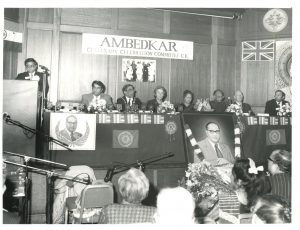 Many people believed that Dr Ambedkar and caste discrimination in the UK needed exposure to the wider audience in the UK. There are only a few instances where the issue of caste discrimination surfaced and was raised at the international forums in the 70s and 80s. The late Mr Bhagwan Dass, a Dalit scholar and an Advocate in the Supreme Court of India made a Statement at the 36th Session of the United Nations Commission on Prevention of Discrimination of Minorities held at Geneva in August 1983. He did this on behalf of the Dr. Ambedkar Mission Society, Bedford and many other organisations from India and abroad.
Many people believed that Dr Ambedkar and caste discrimination in the UK needed exposure to the wider audience in the UK. There are only a few instances where the issue of caste discrimination surfaced and was raised at the international forums in the 70s and 80s. The late Mr Bhagwan Dass, a Dalit scholar and an Advocate in the Supreme Court of India made a Statement at the 36th Session of the United Nations Commission on Prevention of Discrimination of Minorities held at Geneva in August 1983. He did this on behalf of the Dr. Ambedkar Mission Society, Bedford and many other organisations from India and abroad.
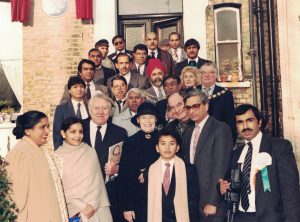
A number of organisations with a common interest in following the teachings of Dr Ambedkar and traditions of Buddhism came together in 1985 and formed a central UK body, the Federation of Ambedkarite and Buddhist Organisations UK (FABO UK). The aim was to strengthen these organisations loose or informal associations with the key objective of propagating the teachings of Dr Ambedkar and Lord Buddha. For this purpose FABO UK made sure that Dr Ambedkar’s contribution as the main architect of the Indian Constitution, human rights movement and gender equality is recognised worldwide.
FABO UK has worked with the India High Commission in London since on marking Dr Ambedkar’s birth and death anniversaries at India House. In nineties, FABO UK donated and installed a large bronze bust of Dr Ambedkar at India High Commission in London. The place where this bust is displayed is now called Ambedkar Hall.
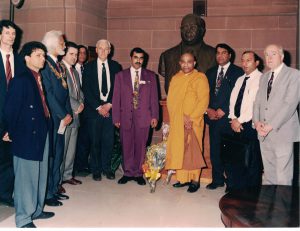 FABO UK also donated a large bronze bust of Dr Ambedkar at the London School of Economics (LSE) where Dr Ambedkar studied during 1921-22. FABOUK has also donated a bronze bust at Columbia University, from where Dr Ambedkar received his PhD in Economics in 1927 and an honorary degree in 1952 as “a great social reformer and a valiant upholder of human rights”.
FABO UK also donated a large bronze bust of Dr Ambedkar at the London School of Economics (LSE) where Dr Ambedkar studied during 1921-22. FABOUK has also donated a bronze bust at Columbia University, from where Dr Ambedkar received his PhD in Economics in 1927 and an honorary degree in 1952 as “a great social reformer and a valiant upholder of human rights”.
FABO UK has donated and planted an Indian bean tree at Gray’s Inn in London (where Dr Ambedkar was called to the bar in 1922). We donated another large bust of Babasaheb to the Simon Fraser University of Vancouver, Canada. Now a number of universities around the world are taking pride to install Dr Ambedkar’s statues in their premises.
We are keen to ensure as many people as possible read Dr Ambedkar’s books on many subjects and his brilliant speeches. So FABOUK donated 60 sets of Dr Ambedkar’s Writings and Speeches to various academic institutions in the UK and USA. We also produce souvenirs with articles on various topics.
The activities undertaken in 1991 by the Ambedkar Centenary Committee set up by FABO UK since, has ensured that the wider public, media, academia and prominent figures in political life are aware of Babasaheb Ambedkar’s vital contribution to modern India and the significance of his movement in the modern world.
To achieve its objective, FABO UK has organised and delivered exhibitions, seminars, lectures and cultural programmes at a number of prestigious places including Houses of Parliament, London School of Economics, Grays Inn, the Royal Commonwealth Society, Oxford University, Columbia University and in a number of libraries in Great Britain. We have also written articles in several newspapers, both the ethnic minority press and the British press. We have participated in TV and radio programmes such as ‘In the Footsteps of Ambedkar’, Caste at Birth, its My Belief, Encounter and ‘The World This week’,
These programmes examined the issue of untouchability in India and its legacy in the UK. We helped Kenneth Griffith make a documentary film on Dr. Ambedkar, which was shown on BBC 2 televisions on 12th October, 1996. During the shooting of Dr. Jabbar Patel’s feature film ‘Babasaheb Ambedkar’, the Federation helped the crew by providing accommodation and transport and later screening the film. In 1991, we also managed to get English Heritage to recognise 10 King Henrys Road, London North West as a place of great significance and installed a ‘blue plaque’ on the exterior of the property.
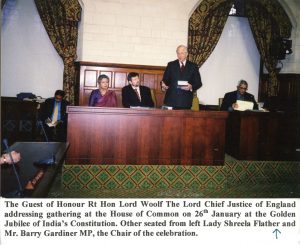
The annual event of the commemoration of April 14, the date of Babasaheb’s birth, continues to be celebrated by FABO UK at the House of Lords presided over by Lord Harries. There we ensure we have different speakers who can make a valuable contribution to highlighting the significance of Babasaheb Ambedkar.
Ambedkar was a victim of caste, he stood against this evil and began crusade to eradicate caste. He wrote on caste, spoke on caste and campaigned against caste to expose the effects of caste on the vast number of people who were forced to live the lives of slaves. When Ambedkar movement started in the United Kingdom, it was the Ambedkarites who talked openly about caste discrimination. First time caste based discrimination in the UK was discussed in the media was by Bedford Ambedkarites on BBC Network East in 1985. Many national and local newspapers followed.
FABO UK has actively lobbied for Caste based discrimination to be included into the Single Equality Bill since 2004 and took part in public demonstrations organisaed by the Anti Caste Discrimination Alliance and others. We issued memorandums, wrote to the parliamentarians. And when anti caste legislation lobby published a report against the need for the law and that caste doesn’t exist in the UK and it was an invention of the British imperialism, Mr Chanan Chahal, former president of FABO UK gave a fitting reply in FABO UK’s report ‘Evil of Caste’. In our meetings, be at the House of Lords or anywhere else, we always raised this issue. Even today it is on the agenda.
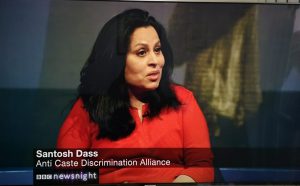 In 2014, Ms Santos Dass, FABO UK’s President spearheaded and robustly lobbied for over a year the Government of Maharashtra to fund the purchase of the £3.1 million 10 King Henry’s Road, London where Dr Ambedkar lived during his studies. GOM finally purchased the house in September 2015 is now a memorial open to the public. It is run by the Ambedkar House Memorial Advisory Committee on which FABO UK sits. Our aim is to make the Ambedkar House of international repute that it comes on the map of British tourism. As Santoshji says “It will be a focal point in the West to spread Dr Ambedkar’s message about equality, human rights and social justice. For untold generations of people to come, 10 King Henry’s Road will become a place of pilgrimage for people around the globe inspired by the fractious history of civil rights, the potential successes of social activism and, of course, Dr Ambedkar’s legacy”.
In 2014, Ms Santos Dass, FABO UK’s President spearheaded and robustly lobbied for over a year the Government of Maharashtra to fund the purchase of the £3.1 million 10 King Henry’s Road, London where Dr Ambedkar lived during his studies. GOM finally purchased the house in September 2015 is now a memorial open to the public. It is run by the Ambedkar House Memorial Advisory Committee on which FABO UK sits. Our aim is to make the Ambedkar House of international repute that it comes on the map of British tourism. As Santoshji says “It will be a focal point in the West to spread Dr Ambedkar’s message about equality, human rights and social justice. For untold generations of people to come, 10 King Henry’s Road will become a place of pilgrimage for people around the globe inspired by the fractious history of civil rights, the potential successes of social activism and, of course, Dr Ambedkar’s legacy”.
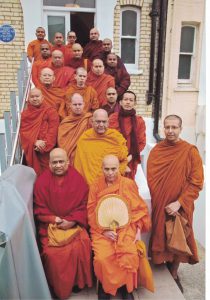 The Ambedkar House is still being developed and a planning permission is underway to convert its status from residential to a memorial. Therefore activities at the house are very limited. When the planning permission is granted, we can organise more small meetings, presentations, seminars and visits by school children so that Dr Ambedkar’s message of equality and social justice gets through.
The Ambedkar House is still being developed and a planning permission is underway to convert its status from residential to a memorial. Therefore activities at the house are very limited. When the planning permission is granted, we can organise more small meetings, presentations, seminars and visits by school children so that Dr Ambedkar’s message of equality and social justice gets through.
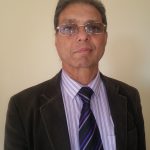
Arun Kumar
Arun Kumar is an equality and human rights campaigner. He is General Secretary of the Federation of Ambedkarite and Buddhist Organisations, UK and the Ambedkar Mission Society, Bedford. He is also a dedicated unpaid voluntary campaigner for legal protetion against caste discrimination in the UK, and has, for over three decades tirelessly promoted the life and works of Dr Ambedkar in the UK and around the world.
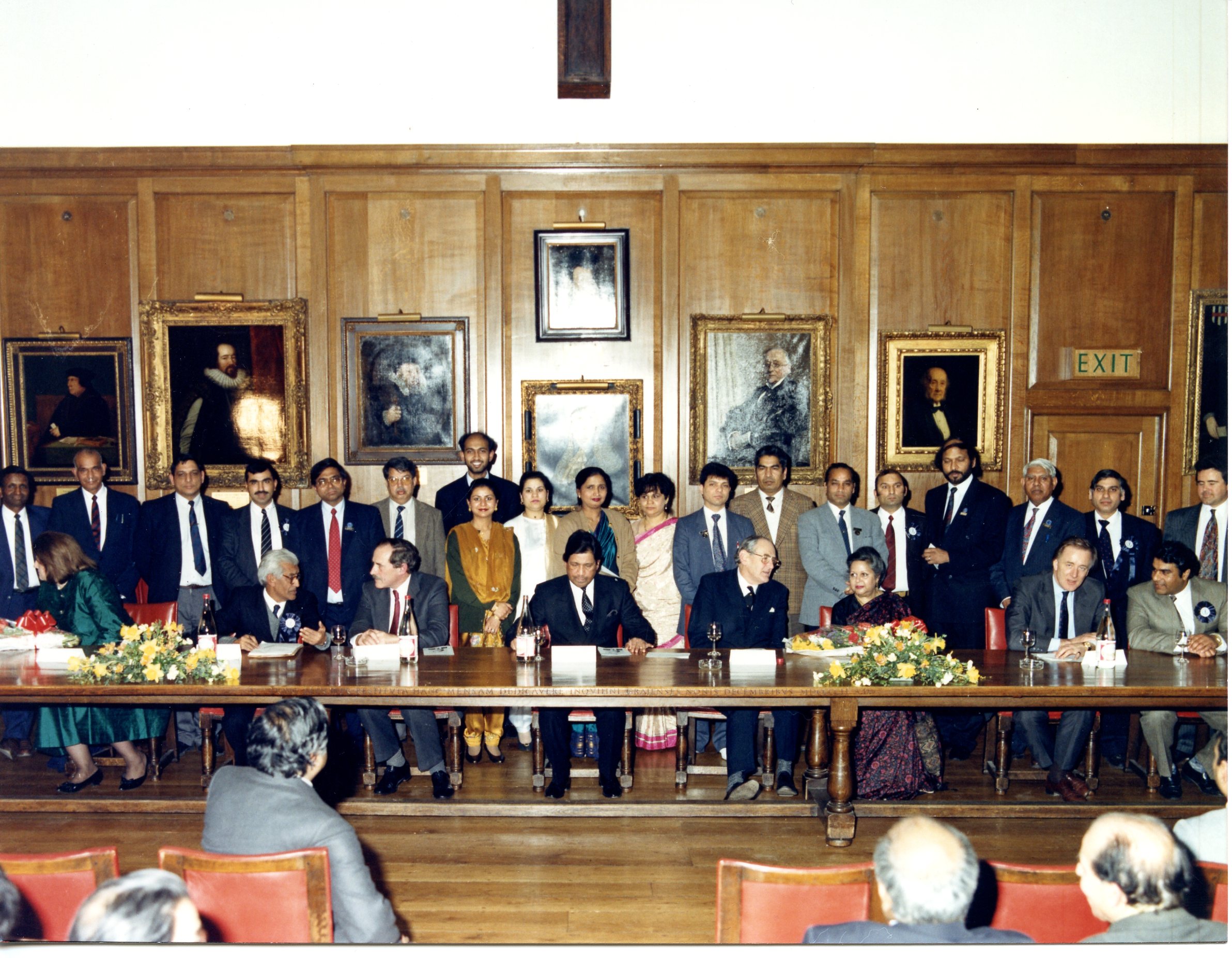


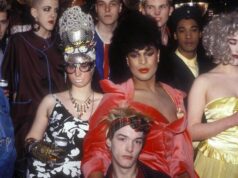

![Powerful Pride documentary Legendary Children [All Of Them Queer] streaming very soon](https://globalindianstories.org/wp-content/uploads/2025/06/Legendary-streaming-release-featured-100x75.jpg)

